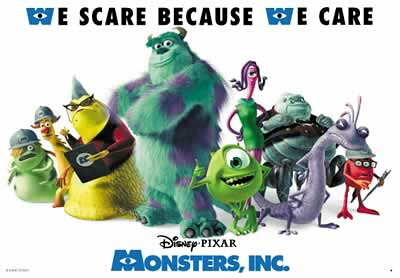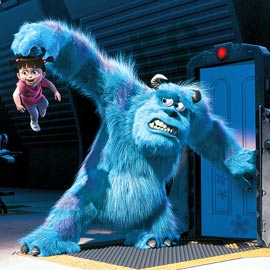
 General Plot: Monsters, Inc. is about two monsters, Sully and Mike, who work for the Monsters, Inc company. Sully and Mike encounter a little girl, “Boo,” who has snuck into the Monster world from the human world via her closet door. Human children are considered a great health risk to monsters and could possibly cause death. Together, with a host of other monsters, Sully, Mike, and (the one of the villains) Randall work to collect “screams” from children. The more the monsters can make the children scream, the more energy they collect. This energy is what powers Monstropolis (Monster City, literally). Sully and Mike spend the whole movie trying to get her back to her world, keeping her safe from the evil intents of Randall and Mr. Waternoose, CEO of Monsters, Inc. During the process of trying to get Boo home safely, Sully discovers that Boo’s laughter is ten times more powerful than her screams. After Sully and Mike defeat Randall and Mr. Waternoose, Monsters, Inc., changes from a “scare” factory to a “laugh factory”.
General Plot: Monsters, Inc. is about two monsters, Sully and Mike, who work for the Monsters, Inc company. Sully and Mike encounter a little girl, “Boo,” who has snuck into the Monster world from the human world via her closet door. Human children are considered a great health risk to monsters and could possibly cause death. Together, with a host of other monsters, Sully, Mike, and (the one of the villains) Randall work to collect “screams” from children. The more the monsters can make the children scream, the more energy they collect. This energy is what powers Monstropolis (Monster City, literally). Sully and Mike spend the whole movie trying to get her back to her world, keeping her safe from the evil intents of Randall and Mr. Waternoose, CEO of Monsters, Inc. During the process of trying to get Boo home safely, Sully discovers that Boo’s laughter is ten times more powerful than her screams. After Sully and Mike defeat Randall and Mr. Waternoose, Monsters, Inc., changes from a “scare” factory to a “laugh factory”.
Gospel Plot: The powerful emotion of love drives the story line of Monsters Inc. But it’s not a
saccharine sweet love, it’s a deeper, heart satiating, other-worldly love. It’s the love of the Gospel Message: the lover loving the unlovable. Paul Zahl writes in his book Grace in Practice, “Grace is love that seeks you out when you have nothing to give in return. Grace is love coming at you that has nothing to do with you. Grace is being loved when you are unlovable. It is being loved when you are the opposite of lovable” (36). Boo loves Sully. She loves him for no reason. She loves him even when he does everything in his power to get rid of her. She loves him even though he is a monster, an unlovable, scary, horrible creature.
This is the beating heart of it. Grace is directed toward what the Scripture calls ‘the ungodly‘ (Romans 5:6). Not just the lonely, not just the sick and disconsolate, but the ‘perpetrators,’ the murderers and abusers, the people who cross the line. God has a heart–his one-way love–for sinners (Zahl 38).
(view from 1:10 to 4:27) Her love for him is true transformative love; her love for him makes him lovable (not in deed, but just because by her love she renames him as lovable). She has no expectation of him, no thought that he should reciprocate; just pure one-way love. She just loves him. “This is the heart of love: it comes to me form outside myself” (Zahl 37).
The rest of the movie demonstrates how Boo’s love for Sully causes his heart to change. He loves her because she first loved him. Sully will risk everything–himself, his best friend, his job–to keep this child, this contaminated, filthy, potentially murderous child safe; even if it means that in order to keep her safe he needs to cut off all contact with her: he will willingly send her home and shred the door, disconnecting them forever. Love is the single most powerful force, more powerful than fear and intimidation. But the ramifications of Boo’s one-way love for Sully does not end with Sully, it converts the Scream factor into a laugh factory because laughter is more powerful than screams; because love is more powerful than intimidation.
The Cross:
(view from 4:38 to 6:00) This closing scene is the lens through which the movie should be viewed. Keeping this end in mind, the movie points to the message of one-way love in the Gospel, and the sacrifice offered by Jesus on the Cross. The movie could haven ended with a bunch of happy monsters making kids happy, but it doesn’t. There is one more thing that needs to be mentioned, there is one more act in the story that needs to be told: the Cross. It is this act of the story that separates the Christian message from all the other religious messages in the world. This is the scene that separates Monsters, Inc., from all other “feel-good” movies. Had this portion of the biblical story been excluded from the movie, the audience would have been left with a good feeling and a saccharine exhortation that falls flat within 10 minutes of having left the theater: now, go love! The Cross imagery at the end tells the audience the source of true, one-way love: Jesus Christ. “We love because he first loved us” (1 John 4:19). He, the Lover, has loved us and renamed us as lovable. We are not capable of drumming up one-way love, we must receive it; and we can only receive it from, in, and through the One who went through all that wood for us because He loved us.

COMMENTS
6 responses to “The Gospel According To Pixar: Monsters, Inc.”
Leave a Reply














Hi! I love your posts. 🙂 They have really influenced me!
Great thoughts on one of my favorite movies!
I wonder if we could see Mike's torture as a bit of a Gethsemane/scourging…also, Sully's return is not unlike the 2nd coming.
Hey Lauren. Real nice to see you back on the blog. Hope I get to see you in April… 🙂
beserkcupcake: thank you for your thoughts! you've encouraged me!
dpotter: that's great insight. in the paper i wrote, i talked about Sully reconnection with boo as the result of the "cross" event of the door being reconstructed. through the cross, through Jesus and in Jesus, we are able to be in communion with the Father. But, i like the second coming Idea a lot. PS: my ultimate fav. movie. plus there's tons of stuff in it, in my opinion, about the law and the second use…hermenuetically speaking, it's l/g all the way (again IMHO).
SD: Dude. Totally…NYC in April all the way. I'm already stoked…!! Can't wait to see you!!
lauren, this is so great.
thanks, dz.